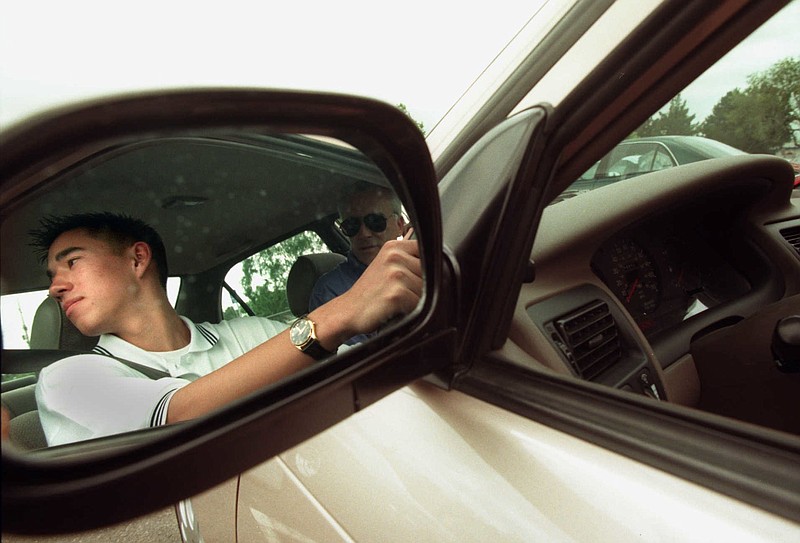Forget what you've been told about the 10-and-2 driving grip.
A safer hand position on a car's steering wheel is 9 o'clock and 3 o'clock. If your hands are too close together and your airbags deploy, your fists could fly into your face.
That's one of the tips that 17-year-old Ooltewah High School student Scott Miles remembers from car-control school at the Atlanta Dragway in Commerce, Ga.
Scott and his mother, Allie MacRae, recently attended the B.R.A.K.E.S. Teen Pro-Active Driving School together to learn emergency driving techniques from race car drivers and other expert instructors.
"Before, I was at four out of 10 in [driving] confidence," Scott says. "Now I'm at seven or eight. I'm not cocky or overconfident, but I'm above average."
B.R.A.K.E.S. is a nonprofit organization that stands for Be Responsible And Keep Everyone Safe. It was started by professional drag racer Doug Herbert after his two sons, ages 17 and 12, were killed in a head-on collision in North Carolina in 2008.
"It only took a moment to lose my two boys - one moment, one bad mistake," Herbert has said. "They were killed instantly. The only thing I can do is try to help kids learn to drive safely. I don't want other parents to go through this."
Every year in America about 6,000 families get the awful news that a teenager has been killed in an automobile accident. The statistics on teen driving are sobering. According to B.R.A.K.E.S., 50 percent of teen drivers are involved in a traffic accident within the first few months of driving, and the chance of a teen experiencing at least one crash in the first three years of driving is 89.2 percent.
B.R.A.K.E.S. training is free, although a refundable $99 deposit is required to hold a spot at one of the roving driving schools. (If they can spare it, many families decide to donate the $99.) A parent must participate in the course along with the teen. Teenagers aged 15-19 who have a driver's license or learner's permit are eligible. Participants drive a fleet of Kias, not their own cars.
There's a B.R.A.K.E.S. school in Atlanta in November. You can register for B.R.A.K.E.S. courses and see a schedule at the organization's website putonthe brakes.org.
Herbert's sons were killed near Cornelius, N.C., while on a breakfast trip to McDonald's. According to news reports, the older boy veered out of his lane in a Mazda3 compact car, lost control and was struck by an oncoming Hummer.
While safer vehicles and driver education have chipped away at the teen traffic death rate, some experts say that simulating road hazards and teaching aggressive emergency driving maneuvers is the only way to really prepare inexperienced drivers for the road.
That's why Herbert started B.R.A.K.E.S., which has trained more than 15,000 teenagers in accident avoidance, panic stops, dealing with distractions and recovering from loss of control of a vehicle.
Seventeen-year-old Scott says the course helped him develop the muscle memory to steer through a crash, rather than recoiling and becoming passive. Before, he figured the car would always protect him. Now he knows better.
"There are experiences that teach you and experiences that grab you. This experience grabs you," Scott says of the four-hour driving school.
Being "proactive" behind the wheel means knowing the performance limits of a car. Training at the B.R.A.K.E.S. course includes practicing panic stops, in which students accelerate quickly and then stand on the brakes to avoid an imaginary skateboarder entering their path. Kids must learn that they aren't going to break the car by stomping on the brakes, Scott says.
In another test, young drivers are placed in a car filled with other teens who are encouraged to distract them with chatter during a slow-speed maneuver.
"After a while, ignoring them becomes hard," Scott says. "You learn: Why risk everything to change the song on a radio or to check a text message?"
In another useful exercise, kids climb into the cab of an 18-wheeler to get a feel for how cars disappear in the blind spots around a big rig.
"A lot of people might say, 'My kid doesn't need this, they've had driver's education,'" said MacRae. "But in driver's ed they don't teach you how to control a car when it's out of control."
When it comes to driving, sometimes you have to be aggressive to be defensive.
Contact Mark Kennedy at mkennedy@timesfreepress.com or 423-757-6645.
Follow him on Twitter @TFPCOLUMNIST. Subscribe to his Facebook updates at www.facebook.com/ mkennedycolumnist.

